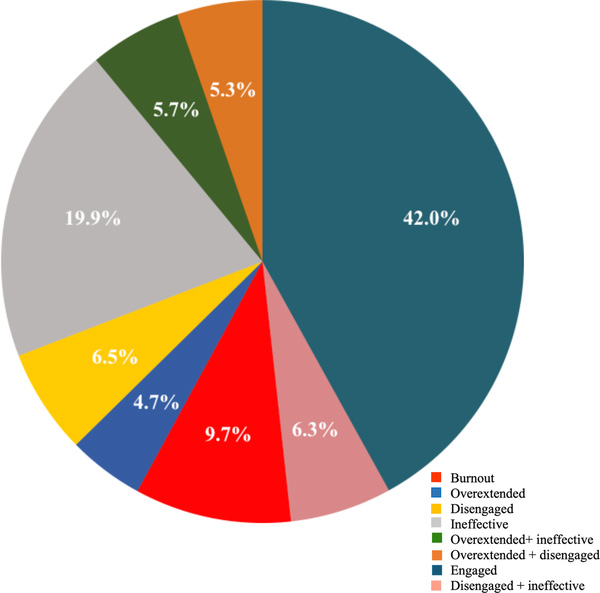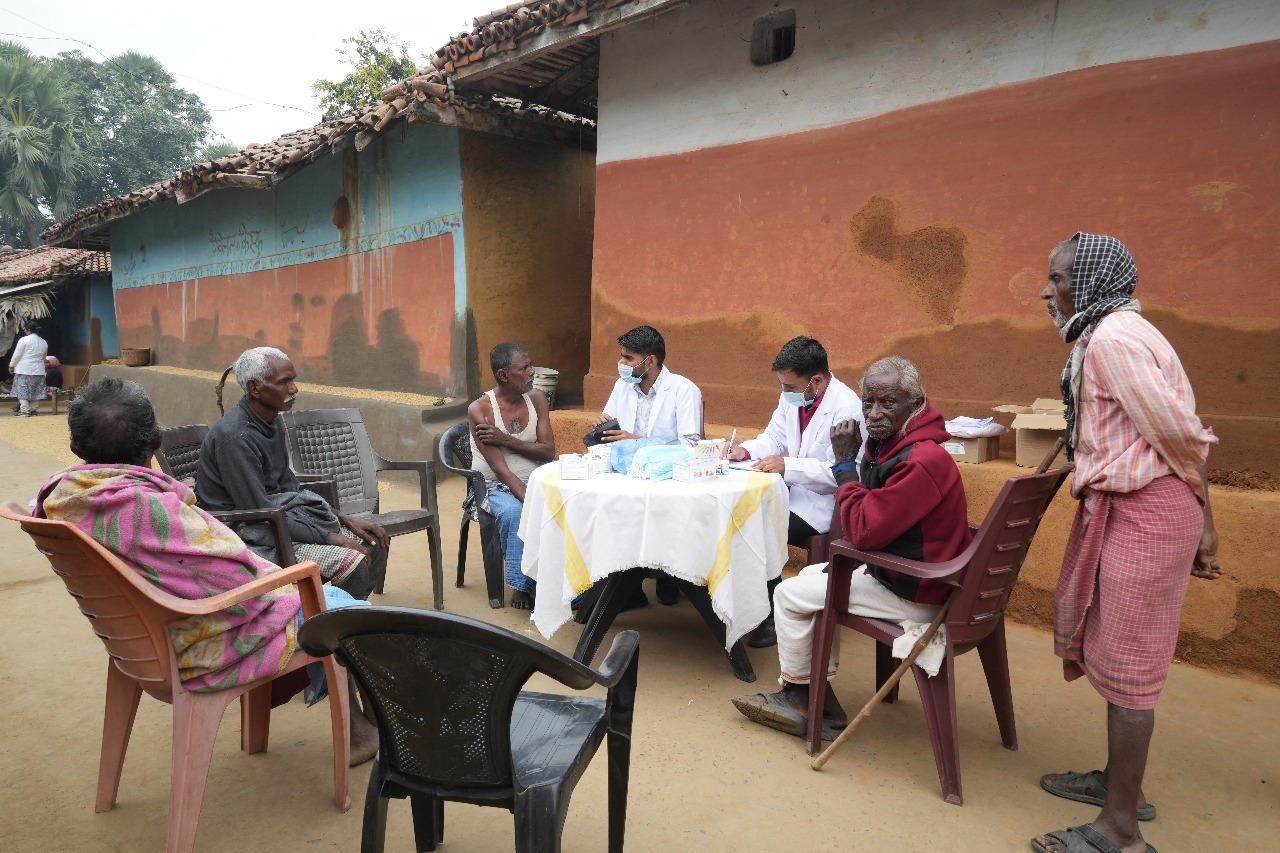
As India marks Doctor’s Day on July 1st, in honour of Dr. Bidhan Chandra Roy’s legacy of selfless service, it is a timely reminder: caring for those who heal us begins with embedding compassion into the very fabric of our health systems.
India’s healthcare system has undergone a profound transformation in the last decade. With a people-first approach, the government has focused on making quality healthcare accessible and affordable to all citizens, especially the underprivileged and rural populations.
Whether it’s the world’s largest health insurance scheme, Ayushman Bharat, or the far-reaching eSanjeevani telemedicine platform, the focus has been clear: affordable, accessible, and accountable healthcare for all.
In the past few decades, India's healthcare sector has undergone significant transformations marked by advancements in infrastructure, technology, and accessibility. This journey towards enhancing public health has been propelled by focused efforts to meet Sustainable Development Goals (SDGs) and a commitment to bolstering healthcare infrastructure.
Doctors and frontline healthcare workers are central to this mission—but face a silent epidemic of burnout
Frontline health workers are the backbone of last-mile service delivery. During crises like COVID-19, their role became even more critical, with the AAA cadre—ANMs, ASHAs, and AWWs—ensuring both emergency response and continuity of routine care. Yet, this essential workforce operates within an overstretched system.
A 2022 meta-analysis of 15 Indian studies reported a burnout prevalence of 24% (emotional exhaustion), and 23% (low personal accomplishment) among healthcare providers (Raj et al., 2022).
During the COVID-19 pandemic, over 52.9% of frontline doctors in 12 Indian states experienced significant psychological distress, including anxiety, insomnia, and emotional detachment (Sharma et al., 2021).
For doctors and health workers alike, this translates into an unsustainable load—and a silent epidemic of burnout. Emotional exhaustion, chronic stress, and compassion fatigue are increasingly eroding the resilience of those we depend on most. Over time, this chronic overload not only wears down providers—it also strains the delicate thread of trust between communities and the health system. When health workers are unable to engage with empathy due to stress or fatigue, community members may perceive care as rushed, impersonal, or inaccessible. In rural and underserved regions, where trust in public services is already fragile, this can widen gaps in health-seeking behaviour and deepen systemic inequities.
During a field visit to a CHC in Bihar, we met an inspiring In-Charge Medical Officer. Driven and visionary, he wasn’t just focused on certification, he wanted to embed lasting quality in service delivery. Under his leadership, the facility achieved certification, and for a while, the system thrived.
A year later, we found a different reality.
The same officer now seemed drained his enthusiasm dulled, his frustration visible. At home, his wife was under palliative care. His son had recently suffered an accident. Juggling clinical duties and administrative responsibilities left him with little time for his family or himself.
His story is a powerful reminder: we can’t build resilient systems without supporting the resilience of those who lead them.
It underscores that compassion is not just a moral ideal—it directly influences how care is delivered, how communities engage with the system, and how resilient the system becomes over time. When embedded intentionally, compassion improves patient outcomes, strengthens trust, and sustains the well-being of healthcare providers themselves.
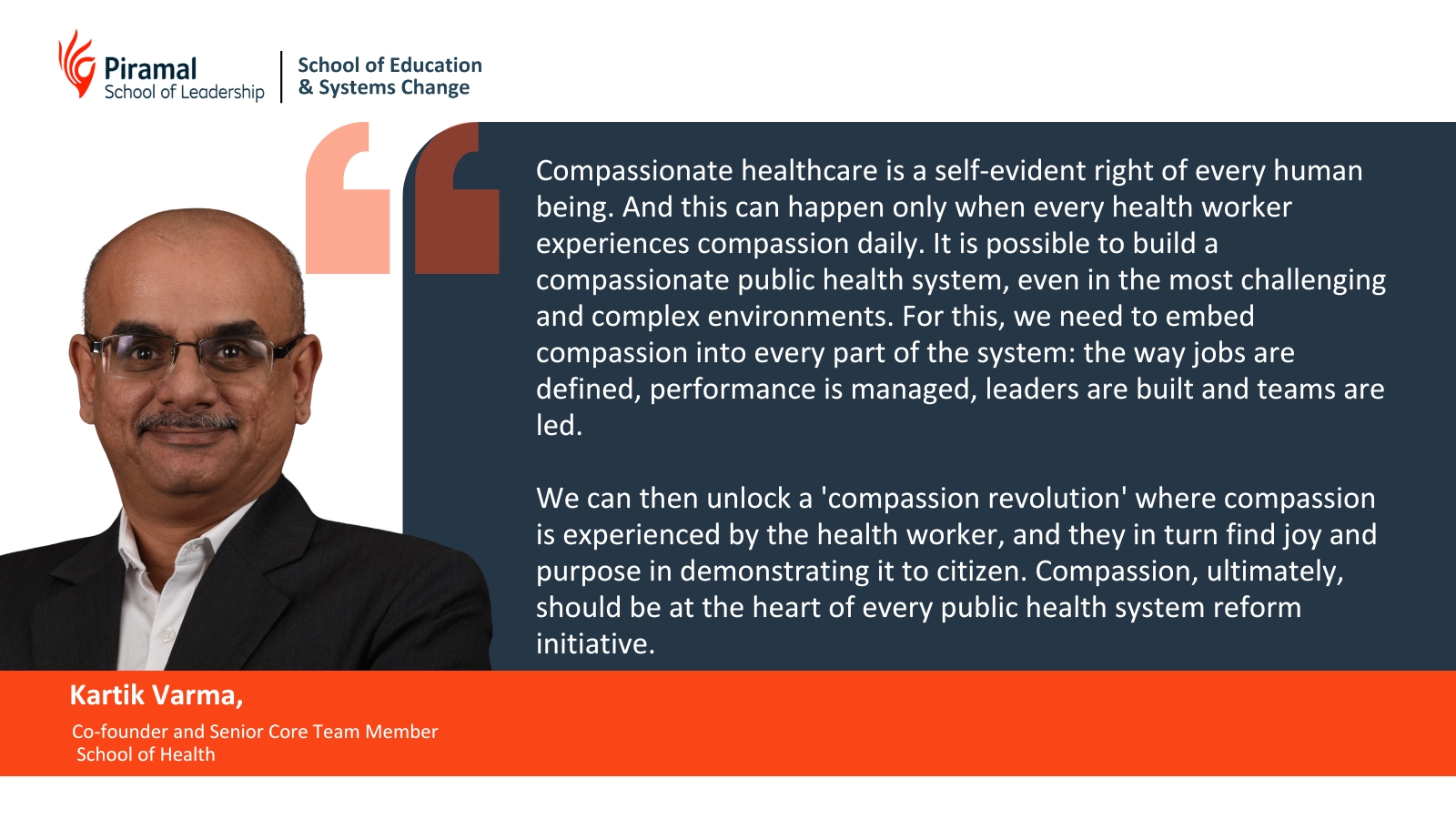
Why Compassion Matters in Primary Health Care: Insights from WHO
WHO defines compassion as a combination of awareness, empathy, and action, integrating clinical competency and systemic support into patient care and underscores compassion as a foundational pillar in Primary Health Care (PHC), for both patient and provider well-being. Compassionate care fosters trust, reduces suffering, and supports holistic health—physical, mental, and social. It improves service quality, lowers stress-related illnesses, and enhances pain management.
For healthcare providers, compassion leads to lower burnout, higher job satisfaction, and stronger patient relationships. At the system level, it supports Universal Health Coverage (UHC) by ensuring care is equitable, accessible, and dignified—especially in low-resource settings.
Compassionate leadership plays a pivotal role, promoting collaboration, emotional intelligence, and institutional resilience. By prioritizing staff well-being, such leadership strengthens retention, reduces burnout, and improves patient outcomes—making compassion not just a value, but a strategy for sustainable healthcare.
On February 7, 2025, the WHO released the report “Compassion and Primary Health Care,” recognizing compassion as both an ethical imperative and a strategic driver in healthcare. The report positions compassion as central to strengthening primary health systems—improving clinical outcomes, reducing costs, and enabling long-term sustainability.
Why Compassion Training Matters for Indian Doctors
In a recent self-assessment conducted by the Indian government, it has come to light that a vast majority of the country's public health facilities are falling short of essential standards mandated by the government. This comprehensive evaluation covered over two lakh healthcare facilities, encompassing district hospitals, sub-district hospitals, community health centers, primary health centers, and Ayushman Arogya Mandirs.
In India’s high-pressure clinical settings especially in public hospitals physicians are routinely exposed to patient suffering, often without the emotional tools to process it. This leads to burnout, depersonalization, and strained patient relationships.
Compassion-based training improves empathy scores by 23% in healthcare students
-Journal of General Internal Medicine, 2021
Compassionate work environments reduce attrition by up to 40%
-Stanford Center for Compassion and Altruism Research
Reduce emotional exhaustion by up to 30% and significantly lower burnout indicators
-Jazaieri et al., 2013
Compassion training offers a critical remedy. Beyond burnout, such training cultivates resilience by promoting healthier emotional boundaries, psychological flexibility, and self-care areas often neglected in traditional medical education.
"Patients come to us with the hope that we will relieve them of their ailments, and we strive to ensure we can cure them. However, in fields like oncology, we often face situations where we cannot save or cure a patient. This failure brings significant stress, as each loss deeply affects us."
- Dr Mandeep Singh Malhotra, Director of Surgical Oncology at CK Birla Hospital, Delhi
Most importantly, it transforms patient interactions: improving empathy, satisfaction, and communication, while also reducing errors.
Beyond individual interactions, compassion also helps restore community trust in public healthcare. In high-pressure settings where patients often feel unseen or dismissed, emotionally attuned providers can make the difference between disengagement and continued care-seeking. By strengthening relational care, compassion training ensures that public health services remain not only functional—but trusted and humane.
In short, compassion is not just humane, it’s a vital skill for sustaining both doctors and the systems they serve.
Compassion training -advancing the vision of Building Bharat from the inside out
Compassion training is a structured approach that equips individuals to recognize suffering both in themselves and others and to respond with empathy, presence, and purposeful action instead of emotional detachment. Drawing from mindfulness, cognitive behavioral therapy, and contemplative traditions, these programs use experiential learning, reflective exercises, and guided practices to build emotional resilience.
Prominent models include Cognitively Based Compassion Training (CBCT) from Emory University, Mindful Self-Compassion (MSC) developed by Neff and Germer, and culturally adapted versions like India’s Yoga- and compassion-based resilience interventions. At its core, compassion training is about turning awareness into action sustainably and skillfully.
To build a healthcare system that prioritizes compassionate leadership, it is important to not only develop and adopt compassion-based curricula at every academic institution and department responsible for health-related learning but also to strengthen the internal systems where respect and compassion are inherent values. This involves building the capacities of state and regional health institutions to deliver compassion curricula and creating partnerships with established academia and development sector organisations to mobilise master coaches and facilitators.
- Dr. Swati Piramal, Vice Chairperson, Piramal Group
Piramal Foundation’s Approach: Embedding Compassion into Public Health Leadership
Rooted in the spirit of Seva Bhaav (selfless service), the Compassionate Leadership & Personal Transformation Training (CL-PTT) initiative was launched by the Government of Bihar and Piramal Foundation to strengthen ethical leadership and personal agency among mid-level healthcare managers. These individuals are the backbone of public health systems, often operating under immense pressure with limited resources.
What makes this initiative stand out is its Omni-Channel Approach (OCA)—a holistic framework that cultivates leadership across personal, social, and system-facing domains. It's not just about management; it’s about transforming mindsets.
Why This Approach Works
- It Starts with the Self:
CBCT® begins by strengthening self-awareness and emotional regulation. From this foundation, professionals are then guided toward deeper compassion for others—creating a ripple effect from the individual to the institution. - It Builds Institutional Culture:
By engaging senior leadership and aligning with ongoing capacity-building programs, compassion training nurtures empathetic leadership, psychological safety, and a shared sense of purpose—factors essential for systemic resilience. - It’s Scalable and Sustainable:
With its hybrid delivery model—combining immersive workshops, guided digital practices, and reflective modules—compassion training offers a low-cost, high-impact solution that doesn't depend on major infrastructure upgrades.
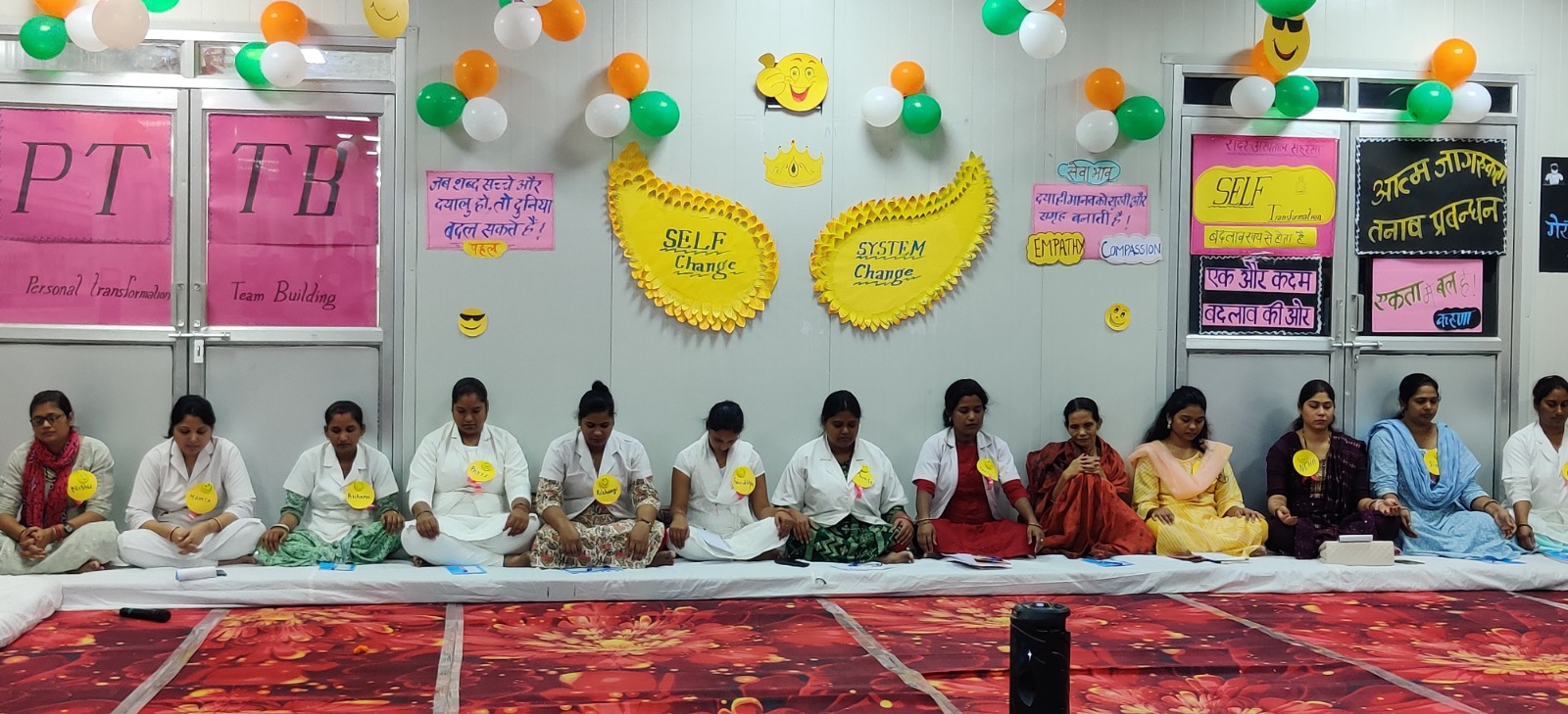
Bihar’s Bold Bet on Compassionate Leadership
Over the past few years, Piramal Foundation has partnered with the Government of Bihar to engage with about 2500 health care providers including medical officers, staff nurses and paramedics on compassionate leadership in healthcare. This isn’t just another training. It’s a system-embedded approach that aligns personal transformation with institutional impact.
A cross-sectional study conducted by Piramal Foundation covering 949 healthcare professionals across 35 district hospitals in Bihar including 239 doctors shows promising results:
- Facilities that implemented CL-PTT saw 5.4x higher leadership competency
- Participants reported improved emotional self-awareness, conflict resolution, and adaptability.
In Bihar, the Compassionate Leadership & Personal Transformation Training (CL-PTT) is doing just that by helping doctors lead with empathy and purpose. In rural communities of Bihar, where the health system is often represented by a single provider or facility, trust is deeply personal and hard-earned. When doctors lead with compassion in such areas, they don’t just improve service delivery—they rebuild the community’s faith in public healthcare.
I struggled with stress, staff shortages, and emotional distance as a ward in charge. Participation in capacity-building workshops on compassionate leadership helped me shift from reactive behaviors to empathetic, team-focused responses.
- Swarnlata Kumari, GNM(General Nurse Midwife), Bihar
Citizens trust us now, bringing their own kids here! People from both cities and villages choose our hospital for its best services. It's a big change – earlier patients were facing challenges but now they get Quality of care in the hospital. We follow best practices and even won National awards for MusQan Certification. We've made a big difference, but we're always getting better!
- Dr. Himanshu, Medical Officer, District Hospital, Sitamarhi
As I embraced empathy and patience, communication improved, collaboration strengthened, and I became the kind of leader who inspires through connection, not control.
- Aditya Nath Jha, District Program coordinator, Samastipur
Doctors who participated in CL-PTT described the experience as practical, motivating, and grounding. The interactive, demonstration-based approach helped them apply core concepts like active listening, conflict resolution, and emotional regulation directly in their day-to-day work.
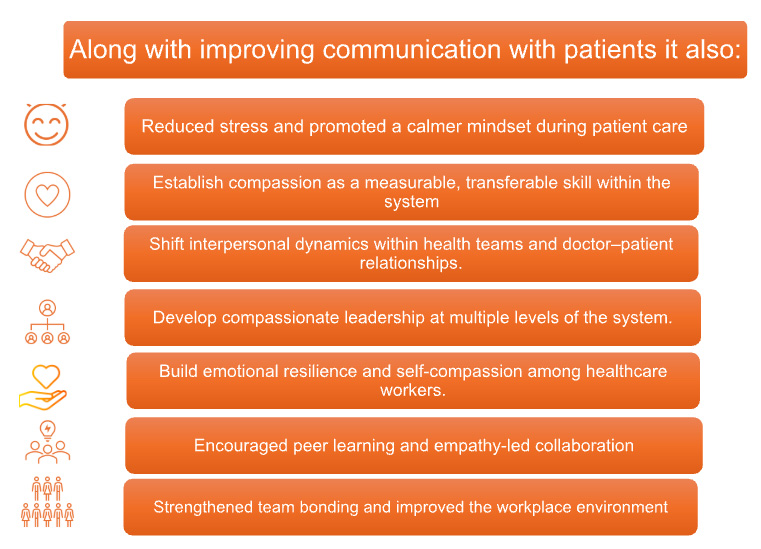
The findings also highlighted that the patients treated by trained doctors were
|
2.5x more likely to feel attentively heard |
91% felt they were given adequate consultation time (vs. 76.5% with non-trained providers) |
81% felt encouraged to ask questions or clarify doubts (vs. 68% for non-trained) |
The Road Ahead: Institutionalizing Compassion
As India moves toward Viksit Bharat, prioritizing the emotional and psychological well-being of its healthcare workforce is critical. The next phase of Piramal Foundation’s initiative aims to scale its trainer network, integrate compassion training into continuous professional development and medical education, and partner with institutions like NIFHW, SIHFW, NHM, Medical Colleges, Nursing Institutes and Training Academies to embed compassion into medical education, continuous professional development (CPD), and governance structures can ensure it becomes part of the health system’s DNA.
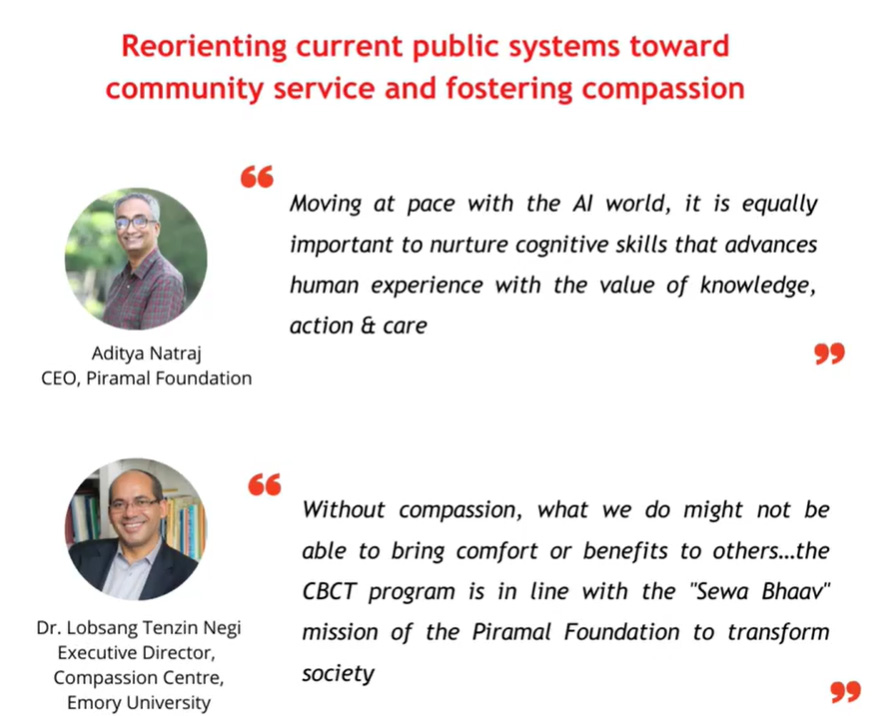
Role of Partners
While improving the ecosystem, we missed out self-transformation. After this workshop conducted by Piramal Foundation, I understand if I change myself, I will be able to influence to improve the outlook of people towards public health facilities
– Mr. Nishant Kumar, Deputy Director, Family Planning, State Health Society, Bihar
The Compassionate and Mindful Leadership (CBCT®) program is anchored in a strong collaborative framework. Emory University serves as the technical partner, leading the design and certification of the CBCT® curriculum. The Government of Bihar plays a key role as the implementation partner, providing access to healthcare facilities, officials, and system-level support. On the ground, the program is enabled by District Health Societies, the State Institute of Health and Family Welfare (SIHFW), and Piramal Foundation’s field teams, ensuring seamless coordination, training delivery, and contextual alignment.
Acknowledgements
We extend our sincere gratitude to Dr. Manish Singh, Senior Program Manager, and Dr. Shuchi Sree, RMLE Manager, for their invaluable guidance, insights, and support in shaping and strengthening the development of this case study.
A Call to Reimagine Public Health Leadership
If we want resilient systems, we need resilient people at the core. Compassion isn’t a luxury—it’s a leadership imperative. By redefining how we support our healthcare professionals, India can lead the way in building not just stronger health systems, but more humane ones.
Sources
https://www.ensureias.com/blog/current-affairs/compassion-and-primary-healthcare-who-report
https://www.pib.gov.in/PressNoteDetails.aspx?id=154668&NoteId=154668&ModuleId=3
https://t20ind.org/research/investing-in-frontline-health-workers-for-a-resilient-health-system/
TAGS
SHARE






